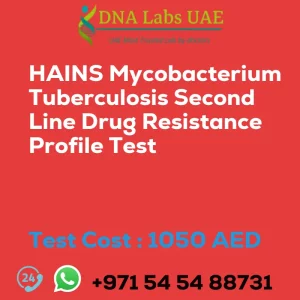Cryptococcus Antibody Test
Are you experiencing symptoms of a Cryptococcus infection? The Cryptococcus antibody test offered by DNA Labs UAE can help diagnose and manage this potentially serious condition. Read on to learn more about the test, its cost, symptoms, and diagnosis process.
Test Name: CRYPTOCOCCUS ANTIBODY Test
Components:
- Price: 1030.0 AED
- Sample Condition: 2 mL (0.5 mL min.) serum from 1 SST. Ship refrigerated or frozen.
- Duly filled Test Send Out Consent Form is mandatory.
- Report Delivery: Sample by 7th of the month; Report after 2-3 weeks
- Method: Agglutination
- Test Type: Infections
- Doctor: Neurologist, Physician, Chest Physician
- Test Department: OS
- Pre Test Information: Duly filled Test Send Out Consent Form is mandatory.
What is the Cryptococcus Antibody Test?
The Cryptococcus antibody test is a laboratory test used to detect the presence of antibodies against the Cryptococcus fungus in the blood. Cryptococcus is a type of fungus that can cause serious infections, especially in individuals with weakened immune systems.
Symptoms and Diagnosis
Common symptoms of a Cryptococcus infection include:
- Fever
- Headache
- Neck stiffness
- Nausea and vomiting
- Confusion
- Blurred vision
If you are experiencing these symptoms, it is important to consult with a healthcare professional, such as a neurologist, physician, or chest physician, who can order the Cryptococcus antibody test for you.
How is the Test Performed?
During the test, a blood sample is collected from the individual and sent to a laboratory for analysis. The sample is tested for the presence of specific antibodies that are produced by the immune system in response to the Cryptococcus fungus.
Interpreting the Test Results
A positive test result indicates that the person has been exposed to the Cryptococcus fungus and has developed antibodies against it. However, it does not necessarily mean that the person currently has an active infection. Additional tests and clinical evaluation may be needed to confirm the diagnosis.
On the other hand, a negative test result suggests that the person has not been exposed to the fungus or has not yet developed detectable levels of antibodies. It is important to note that false-negative results can occur, especially if the test is performed too soon after exposure or if the person’s immune system is not functioning properly.
Conclusion
The Cryptococcus antibody test offered by DNA Labs UAE is a valuable tool in the diagnosis and management of Cryptococcus infections. It helps healthcare providers determine the appropriate treatment plan and monitor the progress of the infection. If you are experiencing symptoms or have concerns about a potential Cryptococcus infection, consult with a healthcare professional who can guide you through the testing process.
| Test Name | CRYPTOCOCCUS ANTIBODY Test |
|---|---|
| Components | |
| Price | 1030.0 AED |
| Sample Condition | 2 mL (0.5 mL min.) serum from 1 SST. Ship refrigerated or frozen. Duly filled Test Send Out Consent Fornis mandatory. |
| Report Delivery | Sample by 7th of the month; Report after 2??3 weeks |
| Method | Agglutination |
| Test type | Infections |
| Doctor | Neurologist, Physician, Chest Physician |
| Test Department: | OS |
| Pre Test Information | Duly filled Test Send Out Consent Fornis mandatory. |
| Test Details |
The Cryptococcus antibody test is a laboratory test used to detect the presence of antibodies against the Cryptococcus fungus in the blood. Cryptococcus is a type of fungus that can cause serious infections, especially in individuals with weakened immune systems. The test is typically ordered when a person is suspected of having a Cryptococcus infection, such as cryptococcal meningitis. It can also be used to monitor the effectiveness of treatment and to determine if a person has been previously exposed to the fungus. During the test, a blood sample is collected from the individual and sent to a laboratory for analysis. The sample is tested for the presence of specific antibodies that are produced by the immune system in response to the Cryptococcus fungus. A positive test result indicates that the person has been exposed to the fungus and has developed antibodies against it. However, it does not necessarily mean that the person currently has an active infection. Additional tests and clinical evaluation may be needed to confirm the diagnosis. On the other hand, a negative test result suggests that the person has not been exposed to the fungus or has not yet developed detectable levels of antibodies. It is important to note that false-negative results can occur, especially if the test is performed too soon after exposure or if the person’s immune system is not functioning properly. Overall, the Cryptococcus antibody test is a valuable tool in the diagnosis and management of Cryptococcus infections. It helps healthcare providers determine the appropriate treatment plan and monitor the progress of the infection. |








